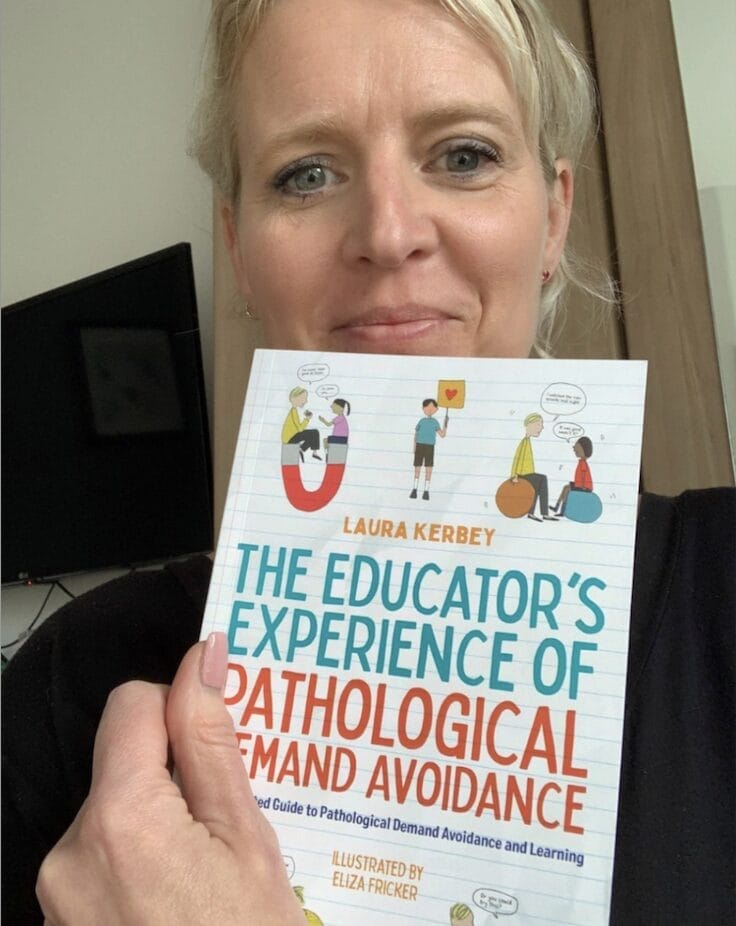Teacher Assistant Course
Understanding & Meeting the Needs of Neurodiverse Students
Teacher Aide Course
✅ 2 Hours, 7 Lessons
✅ Online On-demand Course
✅ Transcript to refer back to forever
✅ Certificate of Completion
✅ Handout includes Additional Helpful Tips
✅ Email questions directly to Sue Larkey
✅ 100% Money back – if, after the first two lessons, you decide the course is not for you
✅ IT support
REVIEWS ⭐️ ⭐️ ⭐️ ⭐️ ⭐️
Teacher Assistant Course
Understanding & Meeting the Needs of Neurodiverse Students
In this course Dean Beadle shares Myths and Misunderstandings about Autism, Executive Functioning and Link to Anxiety, Social Needs & Emotions, Transformative impact Teacher Assistants can Make, How to Disclose Diagnosis, Important of Autistic Joy & More. Dean uses his lived experience, as Autistic, and knowledge training 1000s of school staff to provide strategies and ideas to meet the needs and Neurodiverse of students.
In Dean's course you will learn:
Busting Myths about Autism
This course breaks down common misconceptions about autism, such as the belief that autistic individuals lack social skills, don’t want friends, or are incapable of empathy. You’ll gain a deeper understanding of autistic students, enabling you to create a more inclusive and supportive environment.
Executive Functioning and Anxiety
Learn how executive functioning issues, often mistaken for laziness, are linked to anxiety and exhaustion. You’ll discover practical strategies to support students in managing tasks, reducing stress, and improving focus.
Social Needs and Emotions
Understand the difference between ‘social skills’ and ‘social knowledge.’ This course offers tools to help neurodiverse students navigate social situations and build trusting relationships, tailored to their individual needs.
Lesson Outline
Lesson 1: Meeting the Needs of Nuerodiverse Students
- Busting Four Common Myths about Autism:
* Autistic People Lack Social Skills
* Autistic People Don’t Want Friends
* There is such a thing as Autistic Behaviour
* Autistic People Lack Empathy
Lesson 2: Executive Functioning: Link to Anxiety & Exhaustion
- Why It’s Easy to Confuse Executive Functioning with Laziness
- The Simple Yet Powerful Definition of Executive Functioning
- Lived Experience with Executive Functioning
- Strategies to Support Executive Functioning
Lesson 3: Social Needs and Emotions
- The difference between ‘Social Skills’ and ‘Social Knowledge’
- How to make Social Knowledge work in the ‘real’ world
- Mutual Obligation of Socialisation
- The Power of true alone time
- Allow your students to define what it means to be social
- 2 Key Ingredients for Social Clubs
- Dean Beadle’s 90:10 Rule for Social Activities
- The Ladder of Trust
- What is Alexithrymia and what you can do about it
Lesson 4: Autistic Rights and Place in Society
- Supports & Accommodation to put in place
- Dean’s Primary School Report & Diagnostic Report
- Explanation of Sensory Aversion to having a Hair Cut
- Impact of Labels – ‘Good Dean’ verses ‘Bad Dean’
- How Autistic Youngsters can & should advocate for themselves
- How to help students find a productive & constructive way to deal with feelings
Lesson 5: Transformation Impact Teacher Assistants can Make
- How to leverage the connection between a Teacher Assistant and Student
- Clear Boundaries in the Role and Responsibilities between the Teacher and Teacher Assistant
- How long should you keep the same Teacher Assistant?
- Discussing the Myth that Teacher Assistants are a barrier to peers and teacher
Lesson 6: How to Disclose Diagnosis
- Dean’s personal story and ‘Rule of Thumb’
- Tips for how and when to share the diagnosis
- The Value of Autistic People learning from other Autistic People
- Insights on how the word Autistic can cause anxiety
- Dean’s encouragement – never give up!
Lesson 7: How to Create the Setting for Students to Accept Themselves
- Importance of Autistic voice and how it transformed Dean
- Breaking the Medical Model
- Dean’s 5 pieces of advice to anyone at the beginning of their Autistic Journey
Lesson 8: Autistic Joy
- A window into the beauty and joy of Autism Spectrum
Master Pathological Demand Avoidance (PDA) with Laura Kerbey
Advocating for Autistic Students
Explore how to empower students to advocate for themselves and address sensory challenges. You’ll also learn how to implement effective accommodations and encourage students to express their needs confidently.
The Role of Teacher Assistants
Discover how teacher assistants can make a transformative impact. Learn strategies for setting clear boundaries and fostering a strong student-assistant connection to maximize both academic and social growth.
Embracing Neurodiversity and Autistic Joy
Finally, the course highlights how to support students in embracing their identity. You’ll explore the importance of self-acceptance, sharing diagnoses, and celebrating the joy and strengths of neurodiversity.
BONUS Resources
What Our Participants Say
“This course transformed my teaching approach. The insights into PDA were invaluable and have made a significant difference in my classroom.”
“Laura’s course is a must for any educator. The practical strategies offered are easy to implement and highly effective.”
“I now have a deeper understanding of PDA and how to support my students better. Highly recommend this course!”
“The course content was comprehensive and engaging. It provided me with the tools I needed to make a positive impact on my students’ learning experiences.”
“An excellent course that offers practical advice and strategies. It has helped me become more empathetic and effective in my teaching.”
Is this course for me?

✅ Educators
✅ Primary and Secondary Teachers
✅ Support Staff (ESOs, TAs, LS, LSA, SSOs etc)
✅ Speech, OT, Psychologists, Support Workers
✅ Families/Carers
Pathological Demand Avoidance (PDA) in the Classroom:
Understanding and Teaching Strategies for Educators
✅ 2 Hours, 7 Lessons
✅ Online On-demand Course
✅ Transcript to refer back to forever
✅ Certificate of Completion
✅ Handout includes Additional Helpful Tips
✅ Email questions directly to Sue Larkey
✅ 100% Money back – if, after the first two lessons, you decide the course is not for you
✅ IT support

Enrol in this Course with Confidence
100% Money Back Guarantee & Zero Risk Promise
If you start this course and find that it is not for you, we will refund 100%, no reason required. Just email support@suelarkey.com.au

PDA Online Course
Includes full access to all course materials and a certificate of completion.
To have an invoice sent to your organisation for payment please email support@suelarkey.com.au.
Course Price: ON SALE $79 per person (normally $149 pp)
Group Bookings
For groups of 6 or more please email support@suelarkey.com.au to receive the discounted price. Payment can be made online using a code you will receive of via an invoice we can provide.
Course Price for a group of 6 or more: $99 per person
Meet Laura Kerbey

Laura Kerbey is a best-selling author and a highly respected educator with over 21 years of experience working with young people who have a range of learning difficulties, with a particular passion for supporting and teaching individuals on the autism spectrum. Holding qualifications including MBPsS, BSc (Hons), PGCE, PGCE (Autism), and NPQH, Laura has spent much of her career in schools and colleges, working closely with students, their families, and staff to address the unique barriers to learning that autism can present. She is deeply attuned to the frustration and anxiety that these challenges often cause for students, parents, and educators alike.
Laura’s empathetic and tailored approach has enabled her to work effectively with young people and empower educators and staff with the skills they need to do the same. She offers accredited Autism training at Level 2 and Level 3, as well as Level 2 training on Pathological Demand Avoidance (PDA) accredited by The London Region Open College Network.
Meet Sue Larkey

Sue Larkey is a highly respected educator, author, and speaker with extensive experience in autism spectrum disorder (ASD). She has taught students in both mainstream and special education settings, combining practical experience with extensive research. Sue holds a Master’s in Special Education and has completed the research sections of her Doctorate in Education.
Sue’s podcast, the “Sue Larkey Podcast,” has over 1.3 million downloads across more than 200 episodes and is the #1 ranked Apple Podcast in Australia in the Course category. Her podcast resources are used by leading universities, including Monash University and Canberra University, to train teachers. She also has a global following, with over 135,000 subscribers to her weekly e-newsletter in more than 30 countries and a community of 130,000 Facebook followers.
Sue has authored over 18 books aimed at educators, teacher assistants, and parents/carers, and is a former winner of the Naturally Autistic International Award for Community Contribution. She has delivered hundreds of speeches at both international and national conferences, earning recognition as a trusted source of knowledge, compassion, and inspiration for educators, support workers, and families.
PODCAST: Teacher Aide – Strategies For Success – Insights From Dream Team
Introducing the Podcast “Teachers Aide – Strategies For Success – Insights From Dream Team” – discusses key strategies for teacher assistants to support neurodiverse students, including building relationships, collaborating with teachers, empowering student choice, and facilitating social connections, while ensuring the teacher remains the primary instructor.
Frequently Asked Questions
- When do we get the certificate?
Immediately upon completion of the course.
- Can this Course Count towards my Professional Development?
Yes. Completing Pathological Demand Avoidance (PDA) in the Classroom: Understanding and Teaching Strategies for Educators in the priority area of Students/children with Disability addressing Standard Descriptor(s) 1.2 and 1.5 from the Australian Professional Standards for Teachers
- What age is the course appropriate for?
The course is appropriate for supporting primary and secondary age children.
- Can the course be watched as a group?
Yes, the course can be watched together as a group, however each person participating needs to be individually registered.
- How long do I have to do the course
The initial access period is set to 6 months but we will always extend this if you need longer to complete the course.
- Can I rewatch the course?
Yes, you can rewatch the course as much as you like during the 6 months that the course is available to you.
- I am having technical issues, what do I do?
Contact our team on support@suelarkey.com.au
- When is the course on?
It is an online On-demand course, so it can be watched whenever it suits you.

